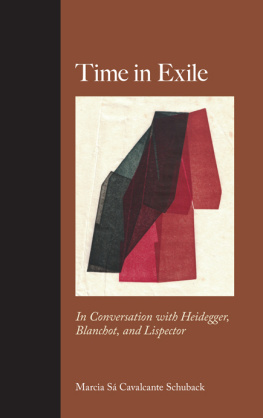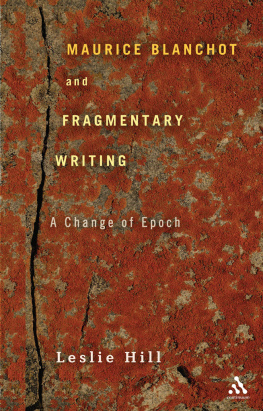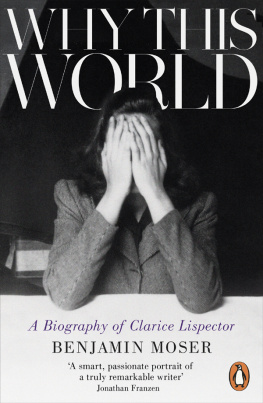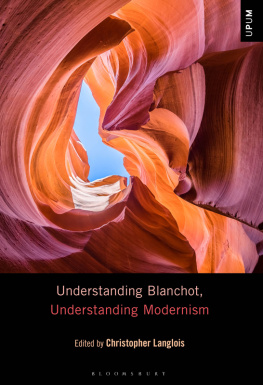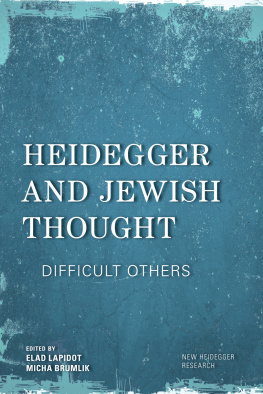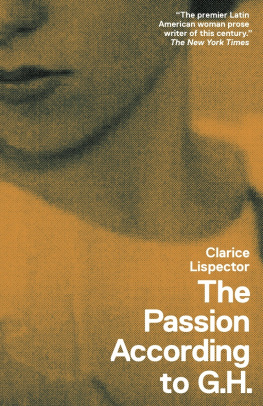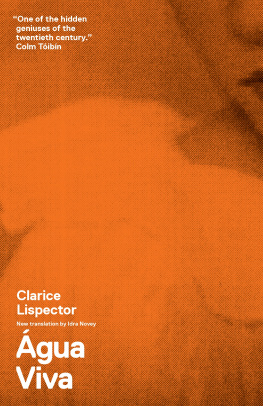Marcia S Cavalcante Schuback - Time in Exile: In Conversation with Heidegger, Blanchot, and Lispector
Here you can read online Marcia S Cavalcante Schuback - Time in Exile: In Conversation with Heidegger, Blanchot, and Lispector full text of the book (entire story) in english for free. Download pdf and epub, get meaning, cover and reviews about this ebook. year: 2020, publisher: State University of New York Press, genre: Romance novel. Description of the work, (preface) as well as reviews are available. Best literature library LitArk.com created for fans of good reading and offers a wide selection of genres:
Romance novel
Science fiction
Adventure
Detective
Science
History
Home and family
Prose
Art
Politics
Computer
Non-fiction
Religion
Business
Children
Humor
Choose a favorite category and find really read worthwhile books. Enjoy immersion in the world of imagination, feel the emotions of the characters or learn something new for yourself, make an fascinating discovery.
- Book:Time in Exile: In Conversation with Heidegger, Blanchot, and Lispector
- Author:
- Publisher:State University of New York Press
- Genre:
- Year:2020
- Rating:3 / 5
- Favourites:Add to favourites
- Your mark:
- 60
- 1
- 2
- 3
- 4
- 5
Time in Exile: In Conversation with Heidegger, Blanchot, and Lispector: summary, description and annotation
We offer to read an annotation, description, summary or preface (depends on what the author of the book "Time in Exile: In Conversation with Heidegger, Blanchot, and Lispector" wrote himself). If you haven't found the necessary information about the book — write in the comments, we will try to find it.
Time in Exile: In Conversation with Heidegger, Blanchot, and Lispector — read online for free the complete book (whole text) full work
Below is the text of the book, divided by pages. System saving the place of the last page read, allows you to conveniently read the book "Time in Exile: In Conversation with Heidegger, Blanchot, and Lispector" online for free, without having to search again every time where you left off. Put a bookmark, and you can go to the page where you finished reading at any time.
Font size:
Interval:
Bookmark:

Time in Exile
SUNY series, Intersections: Philosophy and Critical Theory
Rodolphe Gasch, editor
Time in Exile
In Conversation with Heidegger,
Blanchot, and Lispector
Marcia S Cavalcante Schuback

Cover art by Maria Bonomi, Pndulo (1968)
Published by State University of New York Press, Albany
2020 State University of New York
All rights reserved
Printed in the United States of America
No part of this book may be used or reproduced in any manner whatsoever without written permission. No part of this book may be stored in a retrieval system or transmitted in any form or by any means including electronic, electrostatic, magnetic tape, mechanical, photocopying, recording, or otherwise without the prior permission in writing of the publisher.
For information, contact State University of New York Press, Albany, NY
www.sunypress.edu
Library of Congress Cataloging-in-Publication Data
Names: S Cavalcante Schuback, Marcia, author.
Title: Time in exile : in conversation with Heidegger, Blanchot, and Lispector / Marcia S Cavalcante Schuback.
Description: Albany : State University of New York Press, 2020. | Series: SUNY series, intersections: philosophy and critical theory | Includes bibliographical references and index.
Identifiers: LCCN 2019028111 | ISBN 9781438478173 (hardcover : alk. paper) | ISBN 9781438478197 (ebook)
Subjects: LCSH: Time. | Exile (Punishment) | Heidegger, Martin, 18891976. | Blanchot, Maurice. | Lispector, Clarice.
Classification: LCC BD638 .S395 2020 | DDC 115dc23
LC record available at https://lccn.loc.gov/2019028111
10 9 8 7 6 5 4 3 2 1
To my daughters, Helena and Cecilia,
and also to Andy, my stepdaughter
all beloved daughters of exiled existence
Remember me, remember me. But ah, forget my fate.
Henry Purcell, Ur Dido and Aeneas
But I want much more than that: I want to find the redemption in today, in right now, in the reality that is being, and not in the promise, I want to find joy in this instantI want the God in whatever comes out of the roachs bellyeven if that, in my former human terms, means the worst, and, in human terms, the infernal.
Clarice Lispector
Contents
Chapter 1
Exile as Postexistential Condition
Chapter 2
The Ecstasy of Time (In Conversation with Heidegger)
Chapter 3
Time Absent/Time Present (In Discussion with Blanchot)
Chapter 4
Time Being (Reading Gerundive Time with Clarice Lispector)
Chapter 5
Without Conclusion: A Home in Gerundive
Acknowledgments
No one can bear thoughts alone. Indeed, every thought, even when secreted in extreme solitude, is coauthored and shared with many. As such, the activity of thinking is embodied gratitude. Time in Exile, in Conversation with Heidegger, Blanchot, and Lispector was written on the basis of the lecture course I held at the Collegium Phenomenologicum at Citt di Castelo, in the last week of July 2016, which, under the direction of Alejandro Vallega and Daniela Vallega-Neu, was dedicated to the topic of Embodied Temporalities: Deep Time, Genealogy and Exile. Invited afterward by Rodolphe Gasch, this lecture course was held again in April 2017, under the auspices of Donato Seminar at the Department of Comparative Literature at the University of Buffalo. Without the illuminating discussions and seminars related to the course, held by an extraordinary faculty during the week at the Collegium, and without the debates at Buffalo University, this lecture course would have never reached the shape of this book. I am profoundly indebted to all who shared their thoughts with me in these very inspiring philosophical environments. First of all, I am grateful to Alejandro A. Vallega and Daniela Vallega-Neu for their invitation and philosophical support to develop this manuscript. My gratitude goes also to Rodolphe Gasch, who invited me to Buffalo and encouraged me to publish the lecture course in his series. I am also very grateful to Krzystof Ziarek, Andrew J. Mitchell, Maria Acosta, and Fanny Sderbck, who held inspiring seminars related to the course at the Collegium; to Sean Kirkland, Jason Winfree, and Claudia Baracchi, whose lectures contributed to the development of the thoughts I presented; to Ronald Mendoza-de Jess and Benjamin Brewer and their stimulating comments; to the students who attended the course both in Citt and in Buffalo for their questions; and to Ewa Ziarek, David E. Johnson, and Sergey Dolgopolski, who were present at the lectures at Buffalo University and gave me a lot to think about. I would also like to thank the Department of Philosophy at the University of Dundee, where I could once more exchange main thoughts of this book and receive inspiring inputs from A. O. Patrick Levy, Nicholas Davey, Frank Ruda, Ashley Woodward, Oisn Keohane, Dominc Smith, and Michael Lewis. I extend special thanks to Peter Hanly, who, beyond the seminar he also held at the Citt, has been a partner in many inspiring conversations about the gerund of being. My thanks further go to Jean-Luc Nancy and the discussions we have had in the last years about being with the without, the birth of presence, and the maintenant. My deep gratitude goes to Irina Sandomirskaja and Tora Lane, who read this manuscript with illuminating critical eyes, for the infinite conversations that we have shared through the years, and to Benjamin Brewer, who proofread the manuscript and whose attentive comments helped me to find a philosophical language in English for my ideas. Last but not least, I want to thank Italo-Brazilian artist Maria Bonomi, a very close friend of Clarice Lispector, who was gracious enough to allow me to use her work Pndulo on the cover of this book. This work is part of my private collection; no image could be more fitting to a discussion about time in exile than these beautiful lines of colors hovering as a pendulum in the event of existence.
Introduction
This book presents thoughts of exile from within, trying to grasp the experience of time from within existence in exile. It is a book that aims to do something difficult, namely, to think from the experience of exilic time and not simply about concepts and ideas about time and exile or about personal or collective narratives of exilic experience. It departs from the impact of the time we live in today, but, unlike many other books and discussions of exile, it does not focus on the experience of being outside and displaced. It dedicates its attention rather to the experience of existing inside the outside and to the sensing and senses of time that emerge within exilic experience.
We live today times of the excess of exiles. In the last decades, a huge amount of theoretical literature about exile has been published, and the subject of exile is doubtless a question of increasing political, social, and humanitarian actuality and urgency. Exile has been discussed both empirically and transcendentally, both as human condition and as historical condition and as juridical-political and as psychological-affective issue. It is an old trope in Western culture and has been treated throughout the history of philosophy both implicitly and explicitly. Ontologically, exile has been defined as the movement of all existing things that, as existing, is what comes out of a common ground of being, either nature or God. The ex, out of , that defines ex ile, is already imprinted in the Latin word ex -sistence. But if all existence is a kind of exile from the common ground of nature, of Being or of divine creation, the way existence has been thought and experienced focused mainly on its being-there, its - sistere , stans or instances, that is, its standing. The attention to the ex, to the exilic condition of existence, has been more explicitly emphasized
Font size:
Interval:
Bookmark:
Similar books «Time in Exile: In Conversation with Heidegger, Blanchot, and Lispector»
Look at similar books to Time in Exile: In Conversation with Heidegger, Blanchot, and Lispector. We have selected literature similar in name and meaning in the hope of providing readers with more options to find new, interesting, not yet read works.
Discussion, reviews of the book Time in Exile: In Conversation with Heidegger, Blanchot, and Lispector and just readers' own opinions. Leave your comments, write what you think about the work, its meaning or the main characters. Specify what exactly you liked and what you didn't like, and why you think so.

